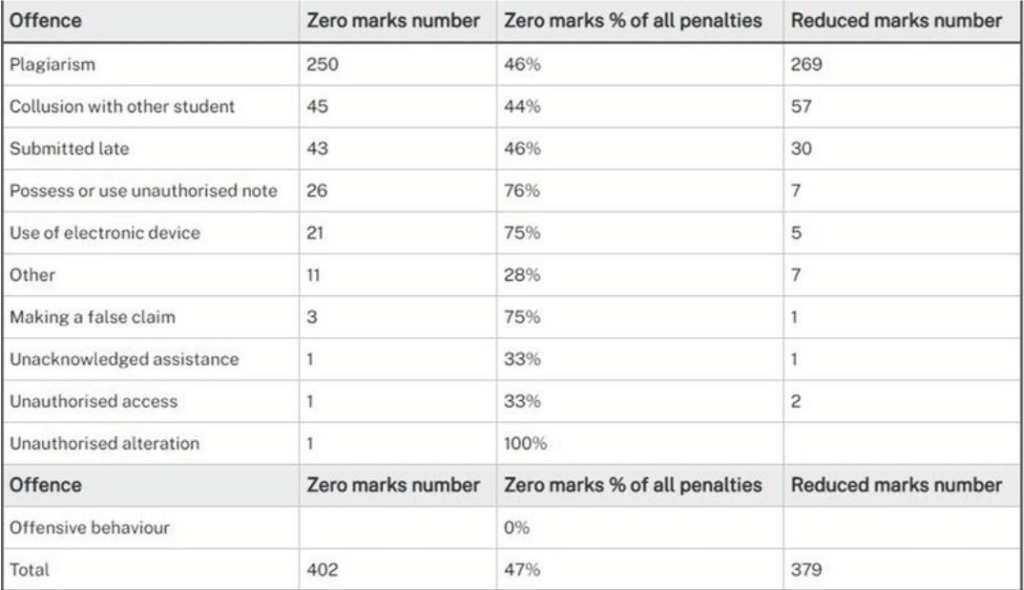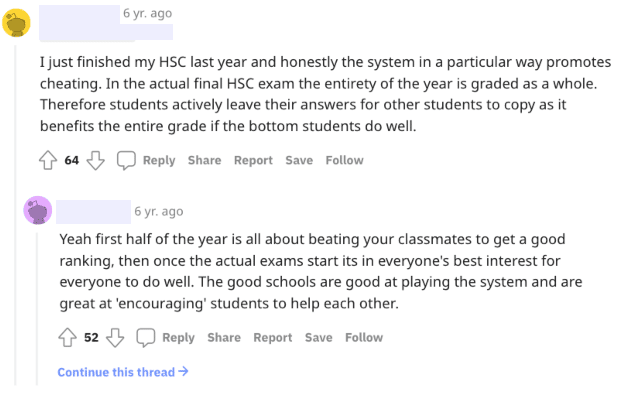Cheating on HSC assessments has jumped in the past year, in a trend attributable to the pandemic as well as other factors. Higher stress levels – due to COVID and plain old academic pressure – combine with evolving learning environments to push some students to unethical conduct in exams.
The Statistics
Data released by the NSW Education Standards Authority (NESA) showed 854 school-based assessment cheating offences recorded in 2021. This represents a 27% increase from numbers in 2019 – the last pre-pandemic cohort.
The most common form of malpractice in internal assessments was plagiarism, with 545 incidents, followed by collusion, late submission, and using unauthorised notes. While cheating in the final HSC exams is far less common, offences there spiked too. 41 students faced cheating infractions last year, compared to 35 in 2019.
Penalised students were handed down zero fail scores, or disqualified from subjects, if they cheated in the final exam. There were a further 215 cases of students not making a serious attempt at the exam – including recording obscene answers, or only attempting multiple-choice questions.

Of course, malpractice is easier outside the watchful eyes of official supervisors. English subjects took the top spots for number of infringements, with English Advanced the most popular at 88, followed closely by English Standard – 86. It’s worth noting, however, that English is the only mandatory HSC subject, and therefore has the highest number of students at all.
The highest rate of cheating was found in Society and Culture, where 5.5 malpractice incidents were recorded for every 1000 students. Ancient History was also up there at 4.9 per 1000. Mathematics Standard had the lowest rates.
What’s Behind the Rise in Cheating?
Students have always been under immense pressure in year 12, and many would agree this has only increased, as degrees get more competitive and university education more the norm.
Experts like James Thorley, regional VP at Turnitin, say creating an environment where students can ‘fail safely’, and deescalating high-stress messaging, is crucial. Schools should focus on “aligning course content to assessment – test what is taught and teach what is tested,” and ensure assessments are varied and ‘low-stakes’. Or, as low-stakes as you can get in the HSC.

COVID has certainly upped the stress for many students, with disrupted schooling and home lives, restrictions on movement and study spaces, and general pandemic anxiety. Professor Phillip Dawson, of Deakin University, also points out the pandemic cut short student-teacher interactions. Some research suggests cheating is dissuaded by closer relationships between teachers and their students.
COVID also forced more learning into the virtual space, and more assessments online, where students have new and exciting malpractice methods.
Students being assessed online are more likely to seek external help from family members or homework help websites, or simply find ways to Google answers or consult notes. Professor Dawson also calls for “increased awareness of the different specialist technology exam cheating tools out there like exam cheating calculators and hidden earpieces”.
Still, while the jump from pre-pandemic cheating is concerning, it represents a small fraction of the state’s 75,000 HSC students. Detection technology is improving just as fast as cheating technology, and almost certainly factors into the growth in numbers.
“The vast majority of HSC students follow the rules in both HSC exams and school-based assessments,” maintained a NESA spokesperson, “so these small instances of malpractice should be kept in perspective.”
Cover photo by Ben Mullins on Unsplash.
Follow Maddie’s journalism on Twitter.
Sign Up To Our Free Newsletter